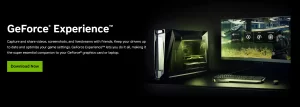Typically, GeForce Experience does not lower your game’s FPS. Its primary functions are to optimize your game settings for the best balance of visual quality and performance and to provide capabilities for game recording and sharing.
However, if your computer’s resources such as CPU or RAM are limited, running GeForce Experience might consume some resources, which could potentially impact the frame rate. If you notice a performance drop with GeForce Experience enabled, you can try disabling unnecessary features or fully closing the program to see if it improves FPS.
Key Features of GeForce Experience

Game Optimization
GeForce Experience is known for its ability to automatically optimize game settings. This feature takes into account your computer’s hardware specifications and adjusts various in-game settings such as resolution, texture quality, and anti-aliasing to achieve a balanced and optimal gaming experience. You can think of it as having a co-pilot who understands the intricate workings of both the game and your PC, tweaking settings for the best output.
Game Recording and Sharing

Another notable feature is the in-built game recording and sharing capability, known as ShadowPlay. This allows you to record gameplay, capture screenshots, and even live stream to platforms like Twitch and YouTube without needing separate software. What’s more, it’s designed to have a minimal impact on performance, so you can record your epic gaming moments without significant hits to your FPS.
Driver Updates
Staying updated is crucial in the world of gaming. With GeForce Experience, you don’t have to worry about keeping track of the latest graphics driver updates. The software does this for you, ensuring that your NVIDIA GPU is running on the most up-to-date driver for optimal performance and stability. This means less time spent on manual updates, and more time spent in-game.
The Impact of GeForce Experience on FPS
Resource Consumption by GeForce Experience
Like any software, GeForce Experience does utilize some of your computer’s resources when running. However, it’s designed to have a minimal impact, especially when you’re in the heat of a game. While it’s busy optimizing game settings or preparing to capture your latest high score, it does its best not to get in the way of your system’s performance.
The resources GeForce Experience uses can vary based on what features you’re using at any given time. For example, the resource usage might be higher if you’re recording gameplay or live streaming compared to simply having the software run in the background.
However, like with any application that runs alongside your game, there’s potential for some degree of performance impact, especially on systems with more limited resources. If your system is already pushing its limits, then additional load from GeForce Experience could potentially cause a dip in FPS.
Does removing GeForce Experience improve performance?
Removing GeForce Experience could potentially improve performance in specific situations. GeForce Experience is designed to be a helpful tool for optimizing game settings, recording and sharing gameplay, and keeping your graphics drivers up-to-date. However, it does require some of your system’s resources to function.
On a system with plenty of resources (like a high-end CPU and ample RAM), the resources consumed by GeForce Experience would likely go unnoticed, and it wouldn’t have a significant impact on your gaming performance.
However, if your system is already near its limit in terms of resources (perhaps you’re running a game that demands a lot of CPU and RAM, or your hardware is older and less powerful), then GeForce Experience could potentially contribute to a performance bottleneck. In such cases, removing or disabling GeForce Experience could free up some resources and might lead to an improvement in game performance.
Frequently Asked Questions
Does GeForce Experience slow down PC?
Typically, GeForce Experience doesn’t significantly slow down your PC. It’s designed to operate efficiently, using minimal system resources to provide its features. However, if your system is already close to its resource limits, the additional load from running GeForce Experience could potentially slow things down. As always, experiences may vary based on individual system configurations.
Does GeForce now affect FPS?
GeForce Now is a cloud gaming service and doesn’t directly affect your local system’s FPS. Instead, it streams games from a powerful remote server, so your local hardware doesn’t have to do the heavy lifting. The quality of your gaming experience on GeForce Now is largely dependent on your internet connection speed and stability, rather than your local hardware’s performance.
Does GeForce Experience increase FPS?
GeForce Experience itself does not directly increase your FPS. Its primary role is to optimize game settings for your specific hardware, aiming for a balance of visual quality and performance. However, by automating these optimizations, it could potentially lead to smoother gameplay and more consistent FPS, especially if you aren’t already optimizing your settings manually.
You may also like: Is it Possible to Use Nvidia Drivers with an AMD Radeon Graphics Card?
